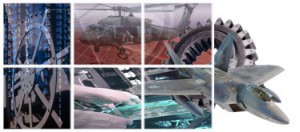The goal of this initiative was to design, build, and deploy an On Demand Simulation Support (ODSS) system prototype within the depot-MRO domain. The ODSS prototype (referred to as the Virtual Planning Wizard – VPW), developed and tested using shared facility data from the paint and strip area at the Oklahoma City Air Logistics Center (OC-ALC), has demonstrated the effectiveness of the ODSS technology for the rapid creation and application of simulation modeling for depot management decision support.
A key facet of ODSS was the integration of a hybrid discrete-event/rule-based simulation engine (a version of this engine exists in the prototype) for execution within an advanced experiment management environment. The VPW is targeted to be a “point-of-need” process and workload assessment tool that is useful by all levels of MRO management for optimizing plans, schedules, situation response, and process designs.
The main innovations achieved during this initiative include (i) a hybrid approach that combines multiple soft computing and knowledge discovery methods for self-adaptive simulation, (ii) a model-based approach that maximizes re-use of domain knowledge for rapid simulation model development and deployment, and (iii) a portal-compliant, distributed, plug and play software architecture that allows for mass customization and rapid deployment of ODSS tools in multiple application situations.
The benefits of the ODSS innovations to current and future OC-ALC/commercial depot process design and analysis initiatives are summarized in the following list.
- Reduced Simulation Lifecycle Costs: ODSS technology will significantly reduce the time, effort, and cost required to develop, deploy, and maintain simulation models. This benefit will accrue through (i) rapid reconfigurability of simulations through the adaptive reconfiguration mechanisms and (ii) reduced costs of model maintenance through reconfigurability and through increased re-use of simulation life cycle information at the domain and design levels over extended periods of time. ODSS’s model-based approach to simulation development will enable future simulation practitioners to rapidly deploy simulations starting from libraries of domain and simulation models.
- Simulation Agility: ODSS will enable end users to rapidly and cost effectively reconfigure the simulation tool architecture in response to constantly changing problem needs and requirements. This capability is achieved through ODSS’s reconfiguration mechanisms and model-based approach to simulation development, helping systems developers use simulation as a mechanism for responding rapidly to unpredictable changes in environments, customer needs, and requirements–true “simulation agility.”
- Affordable, High-Performance Depot process: The application of ODSS to the design of OC-ALC depot processes–in particular, the exploration of multiple depot process design options via ODSS’s simulation based analysis–will lead to the rapid deployment of cost-effective and high-performance depot processes. The use of a simulation-based approach to depot process design and acquisition will allow users to effectively verify/validate depot process operations (and maintenance) early in the development life cycle. This will result in significantly reduced depot process life-cycle costs.
Phase III Development: ESM/Phase Streamlining
The Enhanced Scheduled Maintenance and SOAR (ESM/Phase Streamlining) Tinker Air Force Base effort was a SBIR Phase III project that applied process streamlining and technology from the Phase II effort to the UH-60L and UH-60A Enhanced Scheduled Maintenance (ESM). The objective of the Army Aviation ESM initiative was to replace the current PMS-2 (500-hour Phase Inspection) with a PMI-1 and a PMI-2 (350-hour and 700-hour inspections). The objective of this project was to demonstrate that the analysis, planning, and scheduling technology being developed by the Phase II SBIR ODSS effort could be used to streamline and reduce the Turn-Around-Time (TAT) of the ESM processes.
 Technology and designs for streamlining MH-60 Phase and STIR disassembly, inspection, repair, reassembly, and final test processes are being produced with the Army’s 160th Special Operations Aviation Regiment (SOAR) for the MH-60L and MH-60K Phase/STIR processes under the UH-60 FMD initiative. Advanced decision support technologies were established in the Air Force On-Demand Simulation Scheduling (ODSS) program. During the SOAR initiative, the ODSS WORKSIM® technology was demonstrated to significantly reduce the TAT for the Phase/STIR process. This project leveraged the streamlined process designs and ODSS enabling technologies to address the challenges posed by the ESM PMI-1 and PMI-2 for the UH-60L and UH-60A MDS. This modification provided a tailoring of the SOAR PMS-2 Phase processes to the ESM processes for the UH-60A&L model aircraft and supported the configuration of the ODSS WORKSIM® product to operate as a maintenance company decision support tool for the ESM process.
Technology and designs for streamlining MH-60 Phase and STIR disassembly, inspection, repair, reassembly, and final test processes are being produced with the Army’s 160th Special Operations Aviation Regiment (SOAR) for the MH-60L and MH-60K Phase/STIR processes under the UH-60 FMD initiative. Advanced decision support technologies were established in the Air Force On-Demand Simulation Scheduling (ODSS) program. During the SOAR initiative, the ODSS WORKSIM® technology was demonstrated to significantly reduce the TAT for the Phase/STIR process. This project leveraged the streamlined process designs and ODSS enabling technologies to address the challenges posed by the ESM PMI-1 and PMI-2 for the UH-60L and UH-60A MDS. This modification provided a tailoring of the SOAR PMS-2 Phase processes to the ESM processes for the UH-60A&L model aircraft and supported the configuration of the ODSS WORKSIM® product to operate as a maintenance company decision support tool for the ESM process.
This material is based upon work supported by the United States Air Force under Contract No. F34601-03-C-0443. Any opinions, findings and conclusions or recommendations expressed in this material are those of the author(s) and do not necessarily reflect the views of the United States Air Force.
